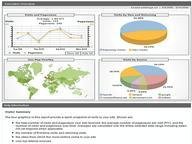Quiz Answer Key and Fun Facts
1. When carrying out a phone survey, people keep hanging up on you and "avoiding" your survey
2. You "initially assume" that your lasagna is 400 calories but you're going to test to see if it's more calories
3. The three test scores are 100, 90, and 50! You needed to "average" more than 75
4. I need to roll doubles with two dice to win the game, what's the "chance"?
5. Election polls show the results could be "within" five percent in either direction, so it's too early to call the winner
6. The doctor says your baby's weight is normal, it fits the typical "bell curve" of expected weights
7. Who wins the prize? Let's put all the names in a hat and everyone has an "equal chance" to win.
8. Let's do a phone survey, but some in the group have "unlisted" numbers. That wouldn't be fair to leave them out
9. Too many mosquitos on the back porch; what would "happen if" we lit a citronella candle? Would we see fewer pesky bugs?
10. It hasn't rained in weeks then we suddenly get four inches of rain on Wednesday. Wow, that is a "unexpected huge difference".
Source: Author
GBfan
This quiz was reviewed by FunTrivia editor
rossian before going online.
Any errors found in FunTrivia content are routinely corrected through our feedback system.
